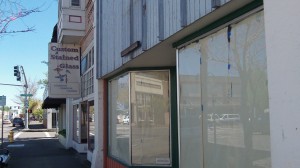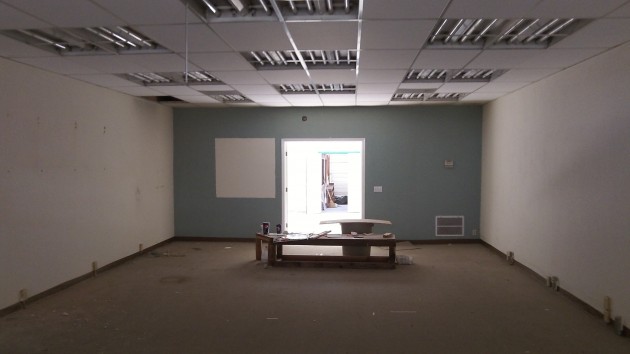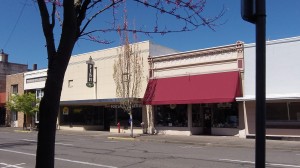 With any kind of luck, the desolate empty space (above) behind the storefront at right will house one of Oregon’s more famous restaurants before another year has gone by. The address is 208 Second Ave. S.W. in Albany. Novak’s Hungarian Restaurant wants to move there from its larger rented space off 14th Avenue S.E., and Albany’s urban renewal advisory board on Wednesday agreed to help — but only after a lot of talk.
With any kind of luck, the desolate empty space (above) behind the storefront at right will house one of Oregon’s more famous restaurants before another year has gone by. The address is 208 Second Ave. S.W. in Albany. Novak’s Hungarian Restaurant wants to move there from its larger rented space off 14th Avenue S.E., and Albany’s urban renewal advisory board on Wednesday agreed to help — but only after a lot of talk.
Last November CARA, the Central Albany Revitalization Area, had approved a $126,000 loan toward the Novak project, which the family then estimated would cost around $627,000. Since then the Novaks discovered the building, once Broder’s Meat Market and most recently a T-shirt shop, had more problems than they thought and the total cost is likely closer to $800,000. Their bank would no longer lend them most of the rest of the amount they need if all they had was a CARA loan, so now they asked for a CARA contribution of $200,000 in the form of a loan to be forgiven once they occupy the rebuilt structure and open their restaurant.
Instead, after more than an hour of back and forth, the majority of the CARA advisory board Wednesday voted for a $200,000 loan to be forgiven in five years. Exactly what that meant would be worked out in the CARA aid contract.
Much of the debate dealt with the cost, the size of CARA’s contribution and whether the building — with its historic façade completely gone and the rest in need of lots of work — was worth saving. Board member Russell Allen wondered where there wasn’t some line beyond which CARA should not go in spending money on buildings too far gone.
In the end, though, the majority appeared to agree with board member Mark Spence, who eloquently recalled the reason CARA was created: to revive Albany’s moribund core area, something that bringing Novak’s downtown would likely help achieve more readily than various other projects the program has funded. Councilor Bill Coburn, for one, said he favored this project more than the restoration of the former Fortmiller Funeral Home building on Third Avenue, for which the board last month approved a grant — not a loan — of $336,000.
What persuaded the majority seemed to be the realization that without CARA’s aid being increased and changed to a forgivable loan, the project would not get done and 208 Second S.W. might remain what it is, an empty socket in a block of mostly nondescript buildings. (The question in my mind was why the board did not just make it a grant effective on the restaurant opening.)
Karen and Kaymarie Novak, the daughters of restaurant founders Joseph and Matilda Novak who fled their native Hungary after the anti-Communist uprising in 1956, appeared before the CARA board along with their architect, Bill Ryals.
Ryals ventured a prediction that unless there are further hurdles or surprises, the new Novak’s might open in six months. (hh)




Please do tell me just where are patrons to park? The nearby “promenade” took away (8) parking spaces! All parking will have to be parallel which is a lost art with most drivers. There are few residences in the immediate area so walking to the place is out. And, just what is the compelling reason to move from a much newer building in an area with abundant pull in parking? It’s lipstick on a pig in my view! JE
Second Avenue and nearby cross streets are full of empty parking spaces during the dinner hour. Lunch time may be a different story, but a little walking before and after eating is good for people. (hh)
I have nothing against the Novaks, but it seems their money could be better spent on a new/existing building that was designed to be a restaurant from ground up.
Downtown is dying, no matter what CARA tries to do.
When is REALITY going to sink in?
Downtown isn’t dying at nearly the rate it was dying before the city council formed the urban renewal district to try to revive it. As for the Novaks, according to their CARA application, their business volume had been affected by the economic recession and they wanted to downsize. The way I read them, they also figure they have a better chance of long-term success downtown, where the Albany museum and the Albany carousel are beginning to attract respectable numbers of visitors. (hh)
So let me get this. One of Oregon’s most succesful restaurants needs $200,000.00 of free money to move and expand. This is like the FEDS picking winners and losers for businesses. If Novaks, a succesful business chooses to move then they should pay the costs to do so. These funds would be better used (if used in this way at all) to bring NEW businesses and new jobs to the area. After all…Linn Co. unemployment rate is still 8.4%. I know a lot of businesses that are hurting here in Albany…they get no help from anyone. They rely on themselves to keep their businesses afloat and hopefully profitable. Bad idea.
Remember that CARA was formed in order to finance and carry out elements of the Town Center Plan of 1995. Repairing and restoring decrepit downtown buildings is part of that mission. The idea is that a community without an identifiable core is just a wide spot in the road. (hh)
Downtown is dying slower?
That means it’s STILL dying.
How many times is a person going to visit the museum or carousel?
Well, you and I might visit either one once a year. But read the carousel story I just posted. They expect lots of visitors, presumably people with a little money to spend. (hh)
I firmly disagree with the statement “Downtown is dying.” That’s BS. It may take some time, but it is a very cute little town that will someday be “the place to be.” I love it and think it will turn around in time. You just wait and see.
Lou Demme Painting
I know the Albany carousel people expect a lot of visitors. But, the Salem carousel expected that, too, at the beginning, I’m sure. You never hear a word about people flocking to the Salem waterfront to go to the carousel. I don’t think they are in large numbers.
Mary, I think the Albany carousel people believe their operation is on a different level. They have this 1909 mechanism they have brought back to life, and they have this amazing volunteer corps of carvers to create attractions to place on the machine. They also have a good many visitors already because of those factors, even though they don’t yet have a working carousel for people to see or ride. (hh)